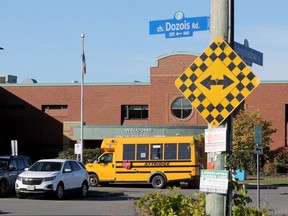Education
Teachers Face Disciplinary Actions Over Controversial Posts

Concerns over social media use by educators have intensified following threats directed at a teacher at St. Mark High School in Manotick, Ontario. The Ottawa Catholic School Board became aware of these threats after a staff member made controversial posts regarding the death of right-wing media commentator Charlie Kirk, who was shot on April 10, 2023, while speaking at Utah Valley University. The teacher’s comments described Kirk as a “hateful, evil man” and expressed a lack of sorrow for his death.
The online discourse surrounding the teacher’s post included strong language, with one comment labeling Kirk as “racist, transphobic and antifeminist.” This sparked significant backlash, leading to an anonymous Facebook post that identified the teacher and urged the community to be cautious about who is instructing students. Some individuals called for the teacher’s dismissal, even providing email addresses for the Ottawa Catholic School Board.
Reports from various media outlets indicate that educators across the United States have faced similar disciplinary actions for their comments regarding Kirk’s death. J.D. Vance, a member of the U.S. Senate, emphasized the need for accountability, stating, “Call them out, and hell, call their employer.” Vance underscored the importance of civility, while also noting that public discourse has shifted, necessitating a careful examination of what educators share online.
According to James Turk, director of the Centre for Free Expression at Toronto Metropolitan University, the dynamic of social media has changed how employers address employee conduct, regardless of whether it relates directly to the workplace. “Each of us has become a publisher,” Turk remarked, highlighting the increased visibility and potential for public pressure that social media affords.
Many school boards, including the Ottawa Catholic School Board, have established policies regarding educators’ social media use. The board’s 2010 policy states that staff may face disciplinary action if their online activity disrupts the school environment or negatively impacts their ability to perform their duties. Similarly, the Ottawa-Carleton District School Board introduced a policy in June 2024, encouraging teachers to maintain professionalism in both personal and professional social media interactions.
Past Cases of Disciplinary Action
Previous incidents illustrate the ongoing scrutiny of teachers’ online behavior. In June 2017, the Durham District School Board investigated Lucas Thad MacDonald after a parent raised concerns about his Twitter activity, which included racial and homophobic comments. MacDonald received a two-day suspension without pay and was transferred to another school as a result.
Conversely, Nadia Shoufani of the Dufferin-Peel Catholic District School Board faced an investigation for remarks made at a pro-Palestinian rally in 2016. Despite accusations of supporting violence, Shoufani was not disciplined, and details regarding the decision remain undisclosed.
The Ontario College of Teachers oversees disciplinary matters relating to educators, with the ability to impose actions ranging from reprimands to revoking certification. In MacDonald’s case, the panel noted that students belonging to marginalized groups might feel uncomfortable knowing their teacher shared certain views online. Ultimately, MacDonald was required to attend sensitivity training and faced a ten-day suspension.
In a notable 2007 case, the college revoked the certification of a teacher who founded an organization critical of multiculturalism, affirming that while freedom of speech is protected, it does not guarantee a teacher’s ability to remain in the classroom.
Balancing Freedom of Expression and Professional Conduct
The distinction between a teacher’s personal and professional life continues to be a critical point of discussion. In a 2017 advisory, the Ontario College of Teachers emphasized that teachers must exercise sound judgment in their off-duty conduct, noting that even seemingly innocent actions could be misinterpreted.
Turk expressed concerns that the current polarized climate could pressure educators to suppress their political expressions. He highlighted that while teachers have the same rights to free speech as any citizen, they must also navigate the complexities of their roles. “You don’t give up freedom of expression because you’re a teacher,” Turk stated.
In the case of the St. Mark teacher, Turk noted that the comments made did not advocate for violence. He cautioned against the potential for school boards to yield to public pressure, which could lead to undue consequences for educators expressing unpopular views.
The ongoing dialogue surrounding teachers and social media underscores the need for clear guidelines that protect both educators’ rights and the integrity of the educational environment. As schools adapt to the evolving landscape of communication, the balance between freedom of expression and professional responsibility remains a vital concern for all stakeholders involved.
-

 Lifestyle3 weeks ago
Lifestyle3 weeks agoWinnipeg Celebrates Culinary Creativity During Le Burger Week 2025
-

 Science1 month ago
Science1 month agoMicrosoft Confirms U.S. Law Overrules Canadian Data Sovereignty
-

 Education4 weeks ago
Education4 weeks agoRed River College Launches New Programs to Address Industry Needs
-

 Health1 month ago
Health1 month agoMontreal’s Groupe Marcelle Leads Canadian Cosmetic Industry Growth
-

 Technology1 month ago
Technology1 month agoDragon Ball: Sparking! Zero Launching on Switch and Switch 2 This November
-

 Science1 month ago
Science1 month agoTech Innovator Amandipp Singh Transforms Hiring for Disabled
-

 Technology1 month ago
Technology1 month agoGoogle Pixel 10 Pro Fold Specs Unveiled Ahead of Launch
-

 Science1 month ago
Science1 month agoChina’s Wukong Spacesuit Sets New Standard for AI in Space
-

 Technology1 month ago
Technology1 month agoWorld of Warcraft Players Buzz Over 19-Quest Bee Challenge
-

 Science1 month ago
Science1 month agoXi Labs Innovates with New AI Operating System Set for 2025 Launch
-

 Business4 weeks ago
Business4 weeks agoDawson City Residents Rally Around Buy Canadian Movement
-

 Business1 month ago
Business1 month agoNew Estimates Reveal ChatGPT-5 Energy Use Could Soar
-

 Technology1 month ago
Technology1 month agoFuture Entertainment Launches DDoD with Gameplay Trailer Showcase
-

 Technology1 month ago
Technology1 month agoGlobal Launch of Ragnarok M: Classic Set for September 3, 2025
-

 Technology1 month ago
Technology1 month agoNew IDR01 Smart Ring Offers Advanced Sports Tracking for $169
-

 Technology1 month ago
Technology1 month agoInnovative 140W GaN Travel Adapter Combines Power and Convenience
-

 Technology1 month ago
Technology1 month agoHumanoid Robots Compete in Hilarious Debut Games in Beijing
-

 Science1 month ago
Science1 month agoNew Precision Approach to Treating Depression Tailors Care to Patients
-

 Health1 month ago
Health1 month agoGiant Boba and Unique Treats Take Center Stage at Ottawa’s Newest Bubble Tea Shop
-

 Technology1 month ago
Technology1 month agoQuoted Tech Launches Back-to-School Discounts on PCs
-

 Technology1 month ago
Technology1 month agoDiscover the Relaxing Charm of Tiny Bookshop: A Cozy Gaming Escape
-

 Technology1 month ago
Technology1 month agoArsanesia Unveils Smith’s Chronicles with Steam Page and Trailer
-

 Education4 weeks ago
Education4 weeks agoAlberta Teachers’ Strike: Potential Impacts on Students and Families
-

 Technology1 month ago
Technology1 month agoRaspberry Pi Unveils $40 Touchscreen for Innovative Projects










